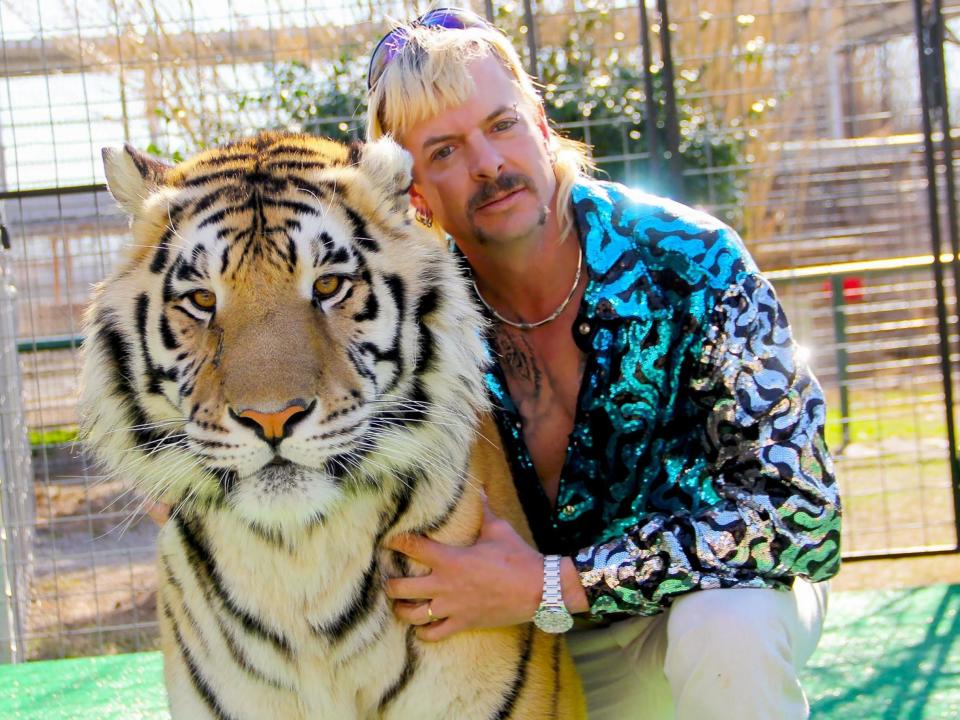Tiger King is popular because we love to laugh at ‘white trash’ – here’s why that’s dangerous

From his bleached mullet and shiny outfits to satin thrones, from condoms with his face on to intimate piercings, Tiger King’s central character, Joe Exotic, is an affront to “good taste”. Likewise, the hot-mess sprawling narrative of addiction, sexual coercion, exploitation, theft, murder, suicide, obsession, guns and explosives. Not to mention the tragic backdrop of inexplicably gratuitous numbers of majestic, dangerous, big cats.
Aesthetically, Tiger King is a documentary of excess. Too many exotic animals in captivity, too many guns and sequins, too much desperation and methamphetamine, too many storylines, too many villains, too, too much. It is addictively engrossing as a result, its popularity during lockdown hinging on revelling in the weird horrors of tasteless, Hicksville excess. Plunged into a weird, crazy world so Other to our own, we feel normal. Witnessing the extraordinarily dangerous combination of caring for big cats, while playing with unregulated guns and explosives, while on meth, makes us feel comparatively safe. What more could we want in lockdown, while the apocalypse rages outside?
But this comfort, this reassurance that we are comparatively sane, normal and safe, depends upon an “us and them” logic that is dangerous. Taste is classed. Taste is political.
Writing about the way we stigmatise working-class celebrity, sociologists Imogen Tyler and Bruce Bennett saw our media as a class pantomime offering “community-forming attachment to a ‘bad object’”. That is, these characters define what we are glad not to be, giving us the opportunity to affirm our comparative superiority through the pleasure of collective scorn.
The cast of Tiger King is depicted in the white trash archetype, a stock character with a long history going back to the US Eugenics Record Office who, between 1880 and 1920, attempted to demonstrate “scientifically” that rural poor whites were “genetically defective”. The rural class entered the public imagination as dirty, drunken, criminally minded, and sexually perverse people. This was used to end welfare and introduce involuntary sterilisation and incarceration. Sociologists Matt Wray and Annalee Newitz argue the stereotype of the “incestuous and sexually promiscuous, violent, alcoholic, lazy, and stupid” redneck persists over a century later. This reads true of the characterisation constructed in Tiger King. While their big cat businesses may turn over huge sums, the sneering pleasure of watching their financial mismanagement reeks of the schadenfreude of being proved right about who does and doesn’t deserve wealth. This is exactly the logic of the eugenics white trash label.
The term “white trash” has always existed to blame those suffering social ills for their situation, suggesting it is a product of their own poor judgement and intrinsic inferiority, not structural inequality. The main characters of Tiger King are horrendous: murderous, abusive – utterly reprehensible. But, beware the pleasures of disgust. “Trash” designates the dregs, dirt or refuse of society. That which should be disposed of.
Why does this matter? Because eugenics is back. From the eugenicist views of former advisor to Downing Street, Andrew Sabisky, to “herd immunity”. From reassurance that coronavirus “only kills the elderly or those with underlying conditions”, as if underlying conditions was code for less than fully a person, to do not resuscitate orders signed against patients’ wishes. From certain groups being told not to go to hospital, saving beds for those with higher chances of survival, to the criminal, political, deliberate underfunding of our health service. These show our leaders’ strategically callous belief in the disposability of human life. Forcing doctors into a position where they must decide who lives creates the most violent discrimination. Beware comforting entertainment predicated on “us and them” logic which imagines “them” to be disposable and not “us”, when our government in a time of health crisis is doing exactly the same to “us”.
Dr Hannah Yelin is a senior lecturer in media and culture at Oxford Brookes University
Read more
Joe Exotic's niece says he was '100 times worse' in real life
Tiger King’s Joe Exotic says he’s ‘done with Carole Baskin saga’
New documentary to explore case of Carole Baskin's missing ex-husband
Netflix is releasing a bonus episode of Tiger King ‘next week’

 Yahoo News
Yahoo News 